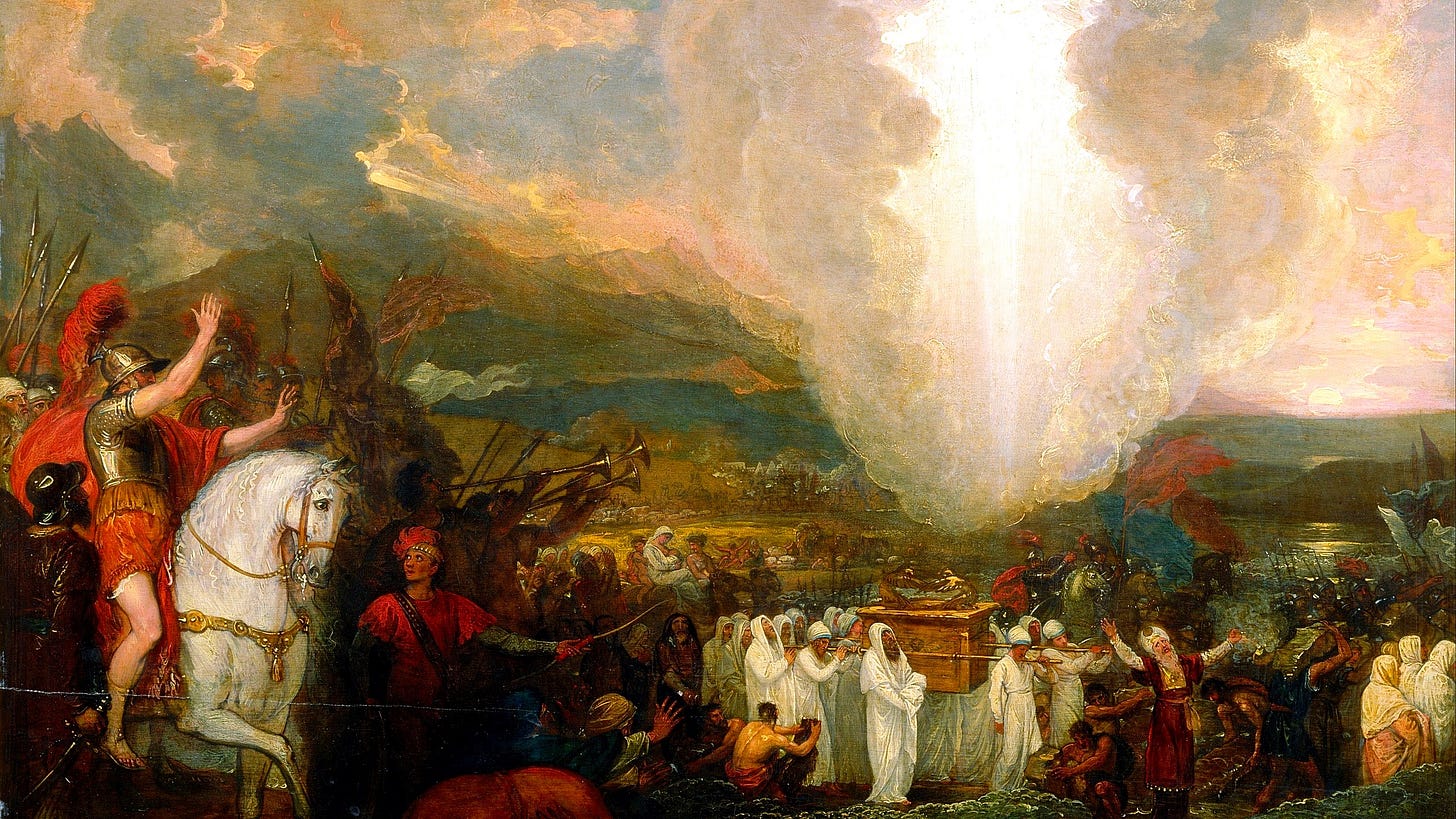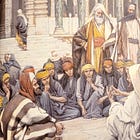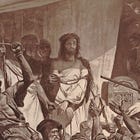Why did Christ call himself 'The Light of the World'?
The priests and the Pharisees were blind to the light of Christ’s divine mission.

The priests and the pharisees were blind to the light of Christ’s divine mission.
Editor’s Notes
Christ’s disputes with the priests and the pharisees in the Temple begin with their interruptions to his public teaching—hostile interjections that expose both their hatred and his majesty.
These exchanges, preserved uniquely by St John, unveil Christ’s doctrine about his Divine Person and mission. They also explain why, months later, the Sanhedrin knew He would not deny the charge of making Himself the Son of God.
In Part I, Father Coleridge outlined the structure of these disputes and shows how each exchange leads closer to the final confrontation.
In this Part, Fr. Coleridge tells us…
How Christ identifies himself as the Light of the World in the face of unbelief.
That his claim is rejected because of spiritual blindness, despite the Father’s clear testimony.
Why his union with the Father makes his words and judgments infallible and divine.
As these debates proceed, Christ’s words provoke resistance and scoffing. The Jews claim to be Abraham’s children and deny any need of liberation. Christ, responding with authority and even patience, warns them that their true father is the devil, the father of lies and murder. In the end, he declares plainly:
“Before Abraham was made, I am.”
This solemn affirmation of His divinity drives His enemies to fury—
and they take up stones to kill Him.
For more context on this episode, its significance and its place in the Roman Liturgy, see here:
Disputes in the Temple
The Preaching of the Cross, Part I, Chapter XIII
St. John viii. 12-20.
Story of the Gospels, § 93
Burns and Oates, London, 1886
Headings and some line breaks added.
Sung on Passion Sunday
How did the Sanhedrin know Christ would affirm his divinity under oath?
What prevented the Jews from hearing Christ’s words properly?
How is Satan ‘a murderer’ and ‘the father of lies’?
What did Christ mean by, ‘Before Abraham was made, I AM’?
‘The Light of the World’
The first of these utterances of our Lord begins abruptly, as it appears to us, with the declaration that He was the Light of the World. If this followed immediately on the incident of the adulteress, and if we are to imagine some external circumstance which may be connected with it, it may be remembered that our Lord had come very early to the Temple, and that the anecdote of the adulteress had occurred almost immediately after the beginning of His teaching.
In such a case it might have happened that within a short time of the conclusion of the matter of that poor woman, the rising sun would have shone down over the summit of the Mount of Olives, to the east of the Temple, and this sudden increase of light and splendour might have been turned by our Lord to account, suggesting to Him the comparison in the words about the light of the world. As the discussion which ensues did not relate in any way to this comparison, it is less necessary to be certain whether this was so or not.
It may be remembered also that about the same time there would be a great lighting up of lamps for the celebration of the morning sacrifice. We are also told that it was a part of the ritual of the festival, which commemorated all the special benefits bestowed upon the people during the wandering in the desert, to celebrate the marvel of the pillar of fire by which the Israelites were guarded by night, by a procession of torches and candles, and by the illumination of the Temple, and, in a certain measure, of the whole city.
Occasion for the words—The objection of the Jews
Any of these circumstances may have furnished our Lord with the text of His own office as the Light of the World, on which He might have enlarged with so much beauty, if it had not been for the captious interruption of His enemies, catching hold of His words the moment He began to speak. We shall have presently an instance of a discourse of our Lord related by this Evangelist, on His own office as the Shepherd of the sheep, in which He was not, as on this occasion, subjected to so much interruption on the part of the Pharisees.
That discourse is a great treasure to us, precisely for the reason that He was allowed, more or less, to say what He had in His Heart on the subject on which He spoke. It was not so now. Thus it is that we have lost what might have been a most precious monument, if our Lord had to any extent poured out the thoughts and affections of His Heart on the subject of the true light which enlighteneth every man, as St. John speaks at the outset of this Gospel. But the men with whom He had now to do were little likely to give Him the opportunity of unfolding the beautiful doctrines involved in His words.
‘Jesus therefore spoke to them again, saying, I am the Light of the World. He that followeth Me walketh not in darkness, but hath the light of life.’
The words themselves seem to contain an allusion to the blessing which was celebrated at this feast, for they speak of following our Lord as the Israelites followed the cloud that led them by day and the pillar of fire by night. But in that case the steps that were guided were those of the material life, those of the journey from one spot to another on the road marked out for them by God to lead them to the promised land. But the steps that are guided by the light of our Lord, are the steps of those who are pressing on to the true land of promise, the steps of the spiritual life which end in the Kingdom of Heaven and in the possession of God. It was a foolish captious interruption, when the Pharisees said to Him, ‘Thou givest testimony of Thyself, Thy testimony is not true.’
It was most true that He spoke with authority, as one who had a right to claim attention and credence. It may be said of all such teachers when they speak concerning themselves, that they give testimony to themselves. But if they have already authenticated their mission by evidences which prove that God is with them and that they speak in His Name, and that He has sent them to teach, then their witness to themselves is true, and rests upon the truthfulness of God. These men determinedly turned a deaf ear to all these evidences of the Divine mission of our Lord. They shut their eyes therefore to the truth that God was manifesting in so many various ways His witness concerning Him.
Its unreasonableness
But it would certainly have been most unreasonable, for One sent like our Lord, not to act and speak authoritatively on the strength of the witness of His Father, which was the appointed evidence of His mission. Not to do so would have been to ignore the action and the counsel of God in carrying out His design for the salvation of the world. In the external sense only, and leaving out of sight the support which He had from His Father’s constant witness in His behalf, could it be said that our Lord gave testimony to Himself in any way in which the criticism of the Pharisees could apply.
The evidences by which the Father had borne witness to our Lord did not in the least degree add to the ineffable dignity of His Person, to His inherent omniscience, and His infallible veracity. They only added the witness which was required for the authentication of His mission, in all its apparent humility and weakness in the eyes of men. It was not true of Him—how could it be?—that His witness to Himself was not true. It was only true that, appearing and speaking as a simple Man among men, His statements regarding Himself needed some witness besides His own to force them upon the miserable incredulity and blindness of those to whom He was sent, and this witness was abundantly supplied by His Father Who had sent Him.
But He had to listen to these constant cavils, involving the utmost irreverence and disrespect to His dignity, and He meets them now with the utmost simplicity and patience.
Answer of our Lord
‘Jesus answered them and said to them, Although I give testimony of Myself, My testimony is true, for I know whence I come, and whither I go, but you know not whence I came, or whither I go.’
Our Lord could not but be conscious, both by His Divine knowledge and by the knowledge of His Sacred Humanity, that He was from God and One with God, in nature, and essence, and in all perfection, therefore in all knowledge and in all veracity. There could not therefore be the slightest doubt or question in the mind of our Lord as to His own truthfulness, nor could there be in Him any possibility of error.
This rested on His perfect knowledge, both human and Divine, as to His relation to His Father, from Whom He received the Divine essence with all its perfections, and by Whom He is sent as Man, and to Whom He returns after His mission in this world has been accomplished.
On the other hand, the Jews to whom He was speaking, notwithstanding all that the Father had done for them in His Providence to furnish them with evidences, which ought to have been far more than sufficient, of the Divine mission of our Lord, did not recognize whence He came or whither He was to go, that is, did not recognize that He was the Incarnate Son of God, and in consequence were foolish enough to bring against Him this childish accusation that He bore testimony to Himself, and that therefore His testimony was not true, or, as they should rather have said, was not sufficiently authenticated to be received as true.
Reference to his former discourse
In this sense He had said to them in the former disputation, a year and a half before this,1 ‘If I bear witness of Myself, My witness is not true,’ and He had then gone on to prove to them that the Father had borne witness to Him in many various ways, as by the declaration of St. John Baptist, by His miraculous works, and the Voice from Heaven at His Baptism. All these things proved Him to be sent by God, and therefore that what He said as from God, whether concerning Himself or on any other point, was to be accepted as true, because God could not bear witness to one who spoke falsely.
After His veracity had been once established, it was not necessary nor convenient that every single word that He uttered concerning Himself should be accredited by fresh evidences on the part of His Father, and it was absurd to question His authority on any point whatsoever on which He might teach.
In that former discourse, to which our Lord is continually making reference in this, He had spoken also of His power of judging, that being a truth which it was very important for them to recognize. It may be for this reason that He now again makes reference to it, although they had not said anything about judgment. But they had in the most decided and presumptuous manner exercised their own judgment concerning Him, resolving, in the face of all the evidences which had been accumulated for them, that He was no more than what He appeared outwardly to be, a mere man.
He says then:
‘You judge according to the flesh, I judge not any man. And if I do judge, My judgment is true, because I am not alone, but I and the Father that sent Me.’
Here He gives the same reason for the truthfulness and also for the authority of His judgment, if He passes any, namely, His union with, His origin from, and His Mission by, the Father. The mission from the Father would have made His judgment authoritative and true as Man, and His union with the Father in nature and essence made it infallible in itself. Thus He was in Himself in His own Person infallible and authoritative, both in witness and in judgment, and besides that, being in His Human Nature the envoy of the Father and supported by the Father, He had beyond His own inherent authority and veracity, the witness of His Father to secure Him credence and reverence and faith from mankind.
This seems to be what He intends them to understand by the words which follow, the meaning of which is somewhat veiled, probably because He knew their malice, and that they were laying wait to catch Him in His words, if He declared openly that He was the Son of God. ‘And in your law it is written that the testimony of two men is true. I am One that give testimony of Myself, and the Father that sent Me giveth testimony of Me.’
Ignorance concerning the Father
‘They say unto Him, Where is Thy Father? Jesus answered, Neither Me do you know nor My Father. If you did know Me, perhaps you would know My Father also.’
He was determined to baffle them, seeing the malice of their questions, for it seems clear that they were desirous of getting Him to state that His Father was God in words which they might lay hold of as the ground of a charge of blasphemy. His words mean that He had a Nature and an existence which they did not recognize, the Divine Nature, in which He was One with His Father, and that as they did not discern in Him this Divine Nature, it was not possible for them to know either Him or His Father.
If, on the other hand, they could have recognized His Divinity, then they would have been on the way to a knowledge of His Father as well as of Himself. St. John adds that He spoke these words in the treasury, that is, in the part of the Temple which was most public and open to all, for it was a part to which women were admitted as well as men, as we learn from the anecdote of the poor widow and her mite.
It may have been that our Lord was in some measure safer from their attacks where there was most publicity, but in any case the Evangelist notes it as a circumstance worthy of mention that no man laid hands on Him because His hour was not yet come, that is, that He was protected in a marvellous and inexplicable way from their enmity, by the providence of God which would not allow Him to fall into their hands before the appointed time.
End of Part II. Having heard Christ declare that he is the Light of the World, the Pharisees respond with cavils about his authority. Patiently but firmly, Our Lord affirms both the divine origin of his mission and the testimony of his Father, exposing their blindness and wilful ignorance.
Disputes in the Temple
How did the Sanhedrin know Christ would affirm his divinity under oath?
What prevented the Jews from hearing Christ’s words properly?
How is Satan ‘a murderer’ and ‘the father of lies’?
What did Christ mean by, ‘Before Abraham was made, I AM’?
Read Next:
Here’s why you should subscribe to The Father Coleridge Reader and share with others:
Fr Coleridge provides solid explanations of the entirety of the Gospel
His work is full of doctrine and piety, and is highly credible
He gives a clear trajectory of the life of Christ, its drama and all its stages—increasing our appreciation and admiration for the God-Man.
If more Catholics knew about works like Coleridge’s, then other works based on sentimentality and dubious private revelations would be much less attractive.
But sourcing and curating the texts, cleaning up scans, and editing them for online reading is a labour of love, and takes a lot of time.
Will you lend us a hand and hit subscribe?
Follow our projects on Twitter, YouTube and Telegram:
St. John v. 31.





